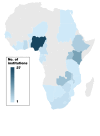Survey of clinical microbiology and infectious disease testing capabilities among institutions in Africa
- PMID: 39531321
- PMCID: PMC12009664
- DOI: 10.1093/ajcp/aqae148
Survey of clinical microbiology and infectious disease testing capabilities among institutions in Africa
Abstract
Objectives: Inadequate laboratory infrastructure and testing capabilities are a major impediment to addressing the infectious disease burden in Africa. Therefore, the aims of this study were to characterize the clinical microbiology/infectious disease laboratory capabilities among countries in Africa.
Methods: A survey to assess the microbiological testing capabilities at hospitals, government laboratories, and free-standing public and private laboratories in African countries was developed by subject matter experts. Questions included institutional demographics and microbiology services in the broad categories of bacteriology, virology, mycology, parasitology, and rapid diagnostics/point-of-care testing. The survey was distributed using the American Society of Clinical Pathology email listserv between June and August 2022.
Results: In total, 131 unique institutions in 28 countries endorsed at least 1 type of microbiology service, with parasitology (80.9%, 106/131) and bacteriology (77.9%, 102/131) being most common, while mycology (45.0%, 59/131) and virology (45.8%, 60/131) laboratories were less prevalent. The most frequently performed bacteriology test was bacterial identification (90.2%, 92/102), followed by aerobic bacterial cultures and antimicrobial susceptibility testing (both 89.2%, 91/102). Among all clinical microbiology/infectious disease laboratories, the most commonly tested agents were HIV (90.8%, 119/131), Treponema pallidum (78.6%, 103/131), Plasmodium falciparum (76.3%, 100/131), Mycobacterium tuberculosis (76.3%, 100/131), and hepatitis C virus (74.8%, 98/131).
Conclusions: These findings provide contemporary data regarding the availability of critical infectious disease testing capabilities among institutions in Africa. These results and future additional studies will be crucial for understanding where strategic investment in the laboratory and public health infrastructure is warranted.
Keywords: bacteriology; clinical microbiology; global health; infectious disease; molecular testing; mycology; rapid diagnostics; virology.
© American Society for Clinical Pathology, 2024.
Conflict of interest statement
The authors have nothing to disclose.
Figures
References
-
- Baron EJ. Clinical microbiology in underresourced settings. Clin Lab Med. 2019;39(3):359-369. https://doi.org/10.1016/j.cll.2019.05.001 - DOI - PubMed
-
- Ombelet S, Ronat JB, Walsh T, et al.; Bacteriology in Low Resource Settings working group. Clinical bacteriology in low-resource settings: today’s solutions. Lancet Infect Dis. 2018;18(8):e248-e258. https://doi.org/10.1016/S1473-3099(18)30093-8 - DOI - PubMed
-
- Moyo E, Mhango M, Moyo P, Dzinamarira T, Chitungo I, Murewanhema G.. Emerging infectious disease outbreaks in sub-Saharan Africa: learning from the past and present to be better prepared for future outbreaks. Front Public Health. 2023;11:1049986. https://doi.org/10.3389/fpubh.2023.1049986 - DOI - PMC - PubMed
-
- Nkengasong JN, Tessema SK.. Africa needs a new public health order to tackle infectious disease threats. Cell. 2020;183(2):296-300. https://doi.org/10.1016/j.cell.2020.09.041 - DOI - PMC - PubMed
-
- Petti CA, Polage CR, Quinn TC, Ronald AR, Sande MA.. Laboratory medicine in Africa: a barrier to effective health care. Clin Infect Dis. 2006;42(3):377-382. https://doi.org/10.1086/499363 - DOI - PubMed
MeSH terms
Grants and funding
LinkOut - more resources
Full Text Sources
Medical


